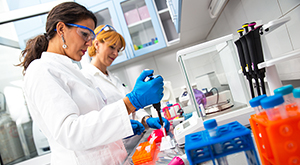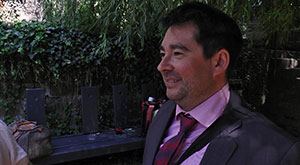Case Study: Senior Postdoc at Fraunhofer IAIS
Dr. Simon Scerri is an internationally-oriented European researcher who underwent undergraduate studies in his native Malta, followed by postgraduate studies and a first postdoc in Ireland (Digital Enterprise Research Institute and the National University of Ireland, Galway) over the course of eight years. In early 2014 he moved to Germany to further diversify his skills and experience, and after completing an ERCIM fellowship at Fraunhofer IAIS he is now a senior postdoc at the same institute and an adjunct lecturer at the University of Bonn. His background remains within the Data Science field, specialising in methods for semi-automatic information extraction and integration, and their applications in various real-life use-cases.
1. Can you tell us a little about your current research position/job?
As a senior postdoc at Fraunhofer IAIS, I lead one of the groups in the Enterprise Information Systems (EIS) department. The group’s main focus is the development of components for the support and realisation of Data Value Chains, with special consideration to big and/or open data sources. As an adjunct lecturer at the University of Bonn, I support with teaching duties at the Department of Computer Science, and with the supervision of PhD and Master Students. The majority of these also contribute to applied (data) science projects in Fraunhofer, which cover topics ranging from Smart Cities and Citizen Science to Big Data Architectures and Enterprise Knowledge Graphs.
2. How did you come to be working and/or studying in Germany?
Having worked intensively with German project partners ahead of his move, I had a good understanding of the German work ethic, modus operandi and expectations. These previous collaborations were the basis for a good networking experience lasting a number of years. One of the established connections agreed to back up an application for an ERCIM fellowship at the same Fraunhofer institute I find myself in today. Following a positive 1-year experience during which I also contributed to the department’s enlargement, I decided to take advantage of the opportunity which arose and stayed on as a full-time member.
3. How easy was it to find employment/a postdoctoral position in Germany?
Having worked on strengthening and extending my international experiences, I found it quite easy to approach Professors and other professionals working in my area in Germany. The fact that my PhD supervisor, Institute director (although not operating within Germany) and other key collaborators during my first postdoctoral experience were also native Germans with good local connections, undoubtedly also helped with securing my reputation as an independent researcher in Germany.
4. What was the application process like (for the position you’re in now)?
Application processes for positions falling under the German public sector (as is the case with the Fraunhofer Society) are uniform and follow a very standard procedure. Any number of candidates can target one open position, following which (if multiple suitable candidates have applied), selective interviews are organised.
5. How accessible is funding for postdoctoral studies/researchers or other academic positions in Germany?
From my observation, most available (funded) positions are also advertised in English and promoted in international circles, since in the globalised setting people are more willing to invest in international highly-skilled and/or experienced employees (who can very realistically learn the local language in under two years, if required), rather than invest in the training of less experienced local individuals. When already based in a German institution, national and European funding for extending an existing position is as accessible as it is for everyone else.
6. What is the best thing about working and living in Germany as a postdoc?
From a European point-of-view, Germany is very well-positioned both in geographical terms as well as in terms of research possibilities, international reputation and collaborations with the industry. The fact that the economy has been a top performer in the region heightens the prospects of local industrial collaborations. The central position facilitates travel from both a business and leisure perspective. In comparison to most other European regions, Germany offers a high standard of living at a very reasonable cost of living. Although every process is visibly more bureaucratic than other countries I have lived in or experienced, at the end if everything is followed to rule in the long-term this translates to peace of mind (insurance, employee rights, health, etc.).
7. Did you find language a barrier to your activities in Germany?
From a professional point of view, there were barely any barriers since although the working language remains German, English is still recognised as the international language and professionals are all capable of holding full conversations. In addition, as I have mostly focused on European and International projects, the limitations have been almost non-existant. From a social perspective, it is an entirely different story, and for this reason alone I am now committed to increase my proficiency in the language since ultimately this can frequently result in a totally unintended form of social exclusion.
8. What tips would you give potential junior researchers or postdocs who wish to continue their studies or work in Germany?
Network! At every occasion prior to applying for a position. If finishing your studies, consider having an external examiner in the country of interest; publish in an international conference organised in that country, so as to get the chance to travel and meet both international and locally-based individuals. If already in Germany, learn the language as early as possible. You can have a fulfilling work and social life without, but you will not be able to get the full cultural experience.
Max Saved Jobs Reached
A maximum of 500 Saved Jobs can be created against your account. Please remove an existing Saved Job in order to add a new Saved Job.
Manage Saved Jobs







